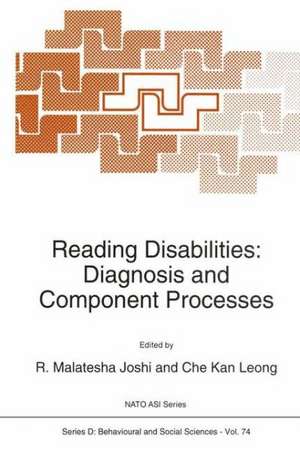Reading Disabilities: Diagnosis and Component Processes: NATO Science Series: D:, cartea 74
Autor Che Kan Leong Editat de R. M. Joshi, C.K. Leongen Limba Engleză Hardback – 31 mai 1993
Preț: 587.83 lei
Preț vechi: 691.56 lei
-15% Nou
Puncte Express: 882
Preț estimativ în valută:
112.50€ • 117.01$ • 92.87£
112.50€ • 117.01$ • 92.87£
Carte tipărită la comandă
Livrare economică 12-26 aprilie
Preluare comenzi: 021 569.72.76
Specificații
ISBN-13: 9780792323020
ISBN-10: 0792323025
Pagini: 344
Dimensiuni: 160 x 240 mm
Greutate: 0.68 kg
Editura: Kluwer Academic Publishers
Seria NATO Science Series: D:
Locul publicării:Dordrecht, Netherlands
ISBN-10: 0792323025
Pagini: 344
Dimensiuni: 160 x 240 mm
Greutate: 0.68 kg
Editura: Kluwer Academic Publishers
Seria NATO Science Series: D:
Locul publicării:Dordrecht, Netherlands
Public țintă
ResearchCuprins
Preface. Part I: Differential Diagnosis for Reading Disabilities. Editors' Introduction. 1. Problems in the Differential Diagnosis of Reading Disabilities; K.E. Stanovich. 2. From Research to Clinical Assessment of Reading and Writing Disorders: the Unit of Analysis Problem; V.W. Berninger, T.M. Hart. 3. Constructing Meaning from Diagnostic Assessment Texts: Validity as Usefulness; P. Afflerbach. 4. Alice in IQ Land or why IQ is still Irrelevant to Learning Disabilities; L.S. Siegel. 5. Towards Developing a Framework for Diagnosing Reading Disorders; Che Kan Leong. Part II: Access to Language-Related Component Processes. Editors' Introduction. 8. Components of Variance Models of Language-Related Factors in Reading Disability: a Conceptual Overview; W.E. Tunmer, W.A. Hoover. 7. Phonemic Awareness, Language and Literacy; J. Morais. 8. The Relevance of Phonological Awareness in Learning to Read: Scandinavian Longitudinal and Quasi-Experimental Studies; Å. Olofsson. 9. Does a Past History of Speech Disorder Predict Literacy Difficulties? B. Dodd, T. Russell, M. Oerlemans. 10. Phonological Processing in Learning Disabled Adolescents; S. Schwartz. 11. Phonological Deficits and the Development of Word Recognition Skills in Developmental Dyslexia; C. Hulme, M. Snowling. Part III: Reading/Spelling Strategies. Editors' Introduction. 12. Dyslexic Reading Strategies and Lexical Access: a Comparison and Validation of Reading Strategy Distributions in Dyslexic Adolescents and Younger, Normal Readers; C. Elbro. 13. The Spelling-Reading Connection and Dyslexia: Can Spelling be Used to Teach the Alphabetic Strategy? J.K. Uhry. 14. Impact of Instruction on Word Identification Skills in Children with Phonological Processing Problems; R.H. Felton. 15. Predicting Reading Acquisition in High and Low IQ Groups; J.C. Näslund. 16. Phonetic Short-Term Memory Representation in Children's Reading of Greek; C.D. Porpodas. 17. Developmental Dyslexia as a Cognitive Style; P.G. Aaron, M. Wleklinski, C. Wills. 18. Reading Comprehension and Related Skills in Nine-Year-Old Normal and Poor Readers; K.P. van den Bos, H.C.L. Spelberg. Author Index.
